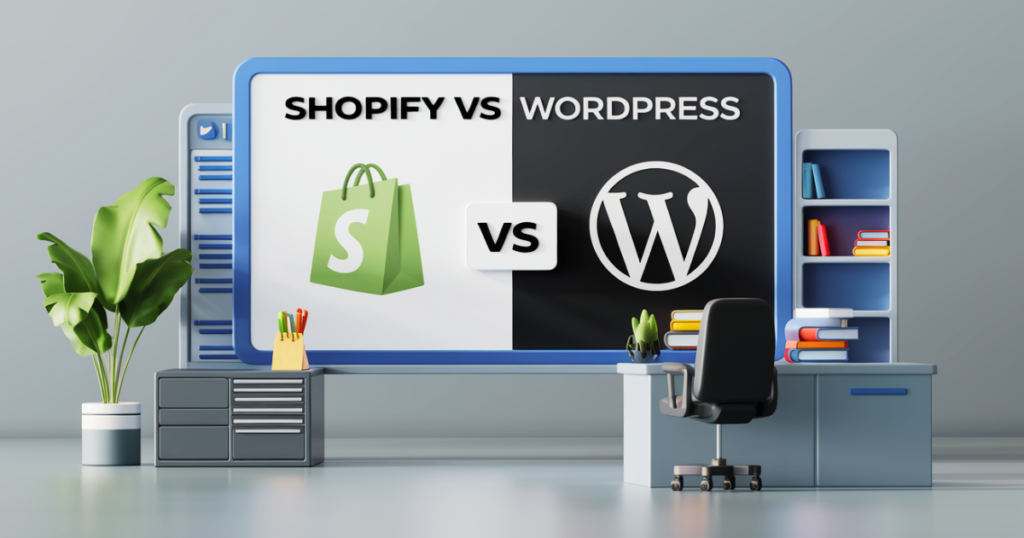Shopify vs WordPress: Which Platform is Best for Your Online Store in 2024

As we step into 2024, the e-commerce landscape continues to evolve rapidly, with more businesses moving online than ever before. Choosing the right platform for your online store is crucial to your success, as it impacts everything from your site’s design and functionality to its SEO performance and overall user experience. Two of the most popular platforms for building an online store are Shopify and WordPress, but which one is the best for your business in 2024? This article will dive deep into the features, benefits, and drawbacks of both platforms to help you make an informed decision.
Understand the Difference Between Shopify vs WordPress
What is Shopify?
Shopify is a dedicated e-commerce platform designed to help businesses of all sizes create and manage online stores. Launched in 2006, it has grown into one of the most popular e-commerce solutions globally, powering over a million businesses.
Key Features of Shopify
Shopify is known for its user-friendly interface and comprehensive e-commerce tools, which include:
- A wide range of customizable themes
- Integrated payment gateways
- Inventory management
- Marketing tools
- SEO features
- App integrations
Advantages of Using Shopify for E-commerce
One of the biggest advantages of Shopify is its simplicity. It’s a fully hosted platform, which means you don’t need to worry about managing servers or dealing with technical issues. Shopify also offers a robust app store, allowing you to extend the functionality of your store with ease. Moreover, Shopify’s customer support is available 24/7, which is a significant plus for beginners.
Check This Also – Top 10 Benefits of Digital Marketing for Business in 2024
What is WordPress?
WordPress is an open-source content management system (CMS) that powers over 40% of all websites on the internet. While it started as a blogging platform, WordPress has evolved into a versatile tool capable of handling complex e-commerce sites, primarily through plugins like WooCommerce.
Key Features of WordPress
WordPress is renowned for its flexibility and customization capabilities, offering:
- A vast library of themes and plugins
- Extensive customization through code or plugins
- SEO-friendly structure
- Strong community support
- Blogging and content management capabilities
Advantages of Using WordPress for E-commerce
The main advantage of using WordPress is its flexibility. Unlike Shopify, WordPress is not limited to e-commerce, which means you can build a website that does much more than just sell products. With plugins like WooCommerce, WordPress transforms into a powerful e-commerce platform, offering extensive customization options and control over every aspect of your site.

Shopify vs. WordPress: Ease of Use
Shopify’s User Interface and Setup Process
Shopify is designed with ease of use in mind. Setting up a store is straightforward, thanks to its intuitive drag-and-drop interface. The platform handles all the technical aspects, such as hosting and security, allowing you to focus on running your business.
WordPress’s User Interface and Setup Process
WordPress, on the other hand, has a steeper learning curve. While it offers more control and flexibility, setting up an e-commerce site requires more time and effort, especially when you add WooCommerce and other necessary plugins. However, once set up, WordPress can be as easy to use as Shopify, depending on your technical skills.
Which Platform is More User-Friendly?
If you’re looking for a quick, hassle-free way to get your store online, Shopify is the better choice. However, if you’re willing to invest time in learning the platform, WordPress offers greater flexibility and control.
Customization and Flexibility
Shopify’s Customization Options
Shopify provides a good level of customization, with many themes and apps available to enhance your store’s functionality. However, the extent to which you can customize is somewhat limited by the platform’s structure, especially if you’re not comfortable with coding.
WordPress’s Customization Capabilities
WordPress excels in customization. With thousands of themes and plugins available, you can build virtually any kind of website you want. Moreover, if you know how to code, the possibilities are endless. This makes WordPress the preferred choice for businesses that need a highly customized website.
The Level of Control Each Platform Offers
While Shopify offers enough customization for most users, WordPress stands out for those who require full control over their site’s design and functionality.
E-commerce Features and Functionality
Shopify’s Built-in E-commerce Tools
Shopify comes with a suite of built-in e-commerce tools, including payment processing, inventory management, shipping options, and analytics. These tools are designed to work seamlessly together, providing a smooth experience for both the store owner and customers.
WordPress’s E-commerce Capabilities
WordPress relies on plugins like WooCommerce to provide e-commerce functionality. WooCommerce is incredibly powerful, offering features like product management, payment gateways, and shipping options. However, because these features come from different plugins, integrating them can sometimes require additional configuration.
Which Platform Offers Better E-commerce Functionality?
For out-of-the-box e-commerce functionality, Shopify is the winner. However, WordPress, with WooCommerce, can match and even exceed Shopify’s capabilities with the right setup.
Design and Themes
Shopify’s Themes and Design Options
Shopify offers a range of professionally designed themes that are mobile-responsive and customizable. While the options are extensive, customization is mostly done through the theme settings, which might feel restrictive to some users.
WordPress Themes and Customization
WordPress offers thousands of themes, both free and premium, with virtually unlimited customization options. Whether you want a minimalist design or a highly complex layout, WordPress can accommodate your needs.
Comparing Design Flexibility
WordPress wins in terms of design flexibility. While Shopify offers beautiful and functional themes, WordPress allows for much deeper customization, especially for those familiar with CSS and HTML.
SEO Capabilities
Shopify’s SEO Features
Shopify includes basic SEO features such as meta tags, alt text, and customizable URLs. However, it can be less flexible when it comes to more advanced SEO tactics, and some users find its SEO capabilities somewhat limited compared to WordPress.
WordPress’s SEO Features
WordPress is renowned for its SEO capabilities. With plugins like Yoast SEO, you have complete control over every aspect of your site’s SEO, from meta tags to sitemaps. WordPress’s structure also tends to be more SEO-friendly out of the box.

Which Platform is Better for SEO?
For those serious about SEO, WordPress is the better option. Its flexibility and the availability of powerful SEO plugins give it a significant edge over Shopify.
Performance and Speed
Shopify’s Performance Metrics
Shopify is a fully hosted solution, meaning the platform handles performance optimization. This generally ensures fast load times and minimal downtime, even under high-traffic conditions.
WordPress Performance Considerations
WordPress performance largely depends on your hosting provider and how well you optimize your site. Poorly managed hosting or unoptimized plugins can lead to slower load times. However, with the right setup, WordPress can perform just as well as Shopify.
How Each Platform Handles Speed and Uptime
Shopify’s managed hosting gives it an edge in terms of performance consistency. WordPress can match this performance, but it requires more effort and expertise to achieve the same results.
Cost and Pricing
Breakdown of Shopify Pricing Plans
Shopify’s pricing plans start at $24 per month for the Basic plan, which includes all essential e-commerce features. The more advanced plans, Shopify and Advanced Shopify cost $359 per month, respectively, offering additional features and lower transaction fees.
Cost Implications of Using WordPress
WordPress itself is free, but there are costs associated with hosting, premium themes, and plugins. Depending on your needs, running a WordPress site can be cheaper or more expensive than Shopify.
Comparing the Overall Value for Money
Shopify offers a straightforward pricing structure, which can be more predictable than WordPress costs. However, WordPress may offer better value for those who require specific customizations and features.
Scalability
Shopify’s Ability to Scale with Your Business
Shopify is built to scale with businesses, from small startups to large enterprises. Its infrastructure can handle large traffic volumes and complex operations without requiring you to manage additional resources.
Scaling a WordPress-based Store
WordPress can also scale effectively, but it requires more attention to hosting and plugin management. As your store grows, you may need to upgrade your hosting plan or optimize your plugins to maintain performance.
Which Platform is Better for Long-term Growth?
Shopify is more convenient for scaling, especially for businesses that prefer not to deal with the technical aspects of growth. However, WordPress offers more flexibility for those willing to manage the scaling process themselves.
Security
Shopify’s Security Features
Shopify provides SSL certificates, PCI compliance, and regular security updates, ensuring your store is secure without any extra effort on your part.
WordPress Security Considerations
WordPress security largely depends on how well you manage your site. While there are excellent security plugins available, you need to stay on top of updates and potential vulnerabilities. Choosing a reliable hosting provider also plays a critical role in maintaining security.
How Secure is Each Platform?
Shopify offers a more hands-off approach to security, which is ideal for those who don’t want to manage it themselves. WordPress can be just as secure, but it requires more diligence.

Customer Support
Shopify’s Customer Support Services
Shopify offers 24/7 customer support via phone, email, and live chat. This is a major advantage for those who may need immediate assistance at any time.
WordPress Support Options
WordPress support is more community-driven, with forums, documentation, and third-party providers offering help. Paid support is also available, but it’s not as centralized or immediate as Shopify’s support.
Which Platform Offers Better Support?
Shopify wins in terms of customer support, thanks to its dedicated and easily accessible support team. WordPress support can be effective but often requires more effort to find the right help.
Case Studies and Real-World Examples
Success Stories of Shopify Stores
Many successful businesses, from small boutiques to large brands, use Shopify. For example, Gymshark, a fitness apparel brand, scaled from a small startup to a multimillion-dollar company using Shopify’s platform.
Successful WordPress E-commerce Sites
WordPress also powers successful online stores, such as WooCommerce-based sites like All Blacks, the official store of New Zealand’s national rugby team. These sites leverage WordPress’s flexibility and powerful e-commerce features.
Lessons from Real-world Applications
Both platforms have proven successful in real-world applications. The choice between Shopify and WordPress often comes down to the specific needs and resources of the business.
Final Words
In 2024, the choice between Shopify and WordPress for your online store depends on your specific needs and priorities. Shopify offers ease of use, reliable performance, and excellent customer support, making it ideal for those who want a straightforward, all-in-one solution. WordPress, on the other hand, offers unparalleled flexibility, customization, and control, which can be invaluable for businesses with more complex requirements or those looking to build a unique, highly customized online presence.
If you value simplicity and quick setup, Shopify might be the better choice. However, if you’re looking for a platform that can grow and evolve with your business, offering limitless customization options, WordPress could be the better long-term investment.
